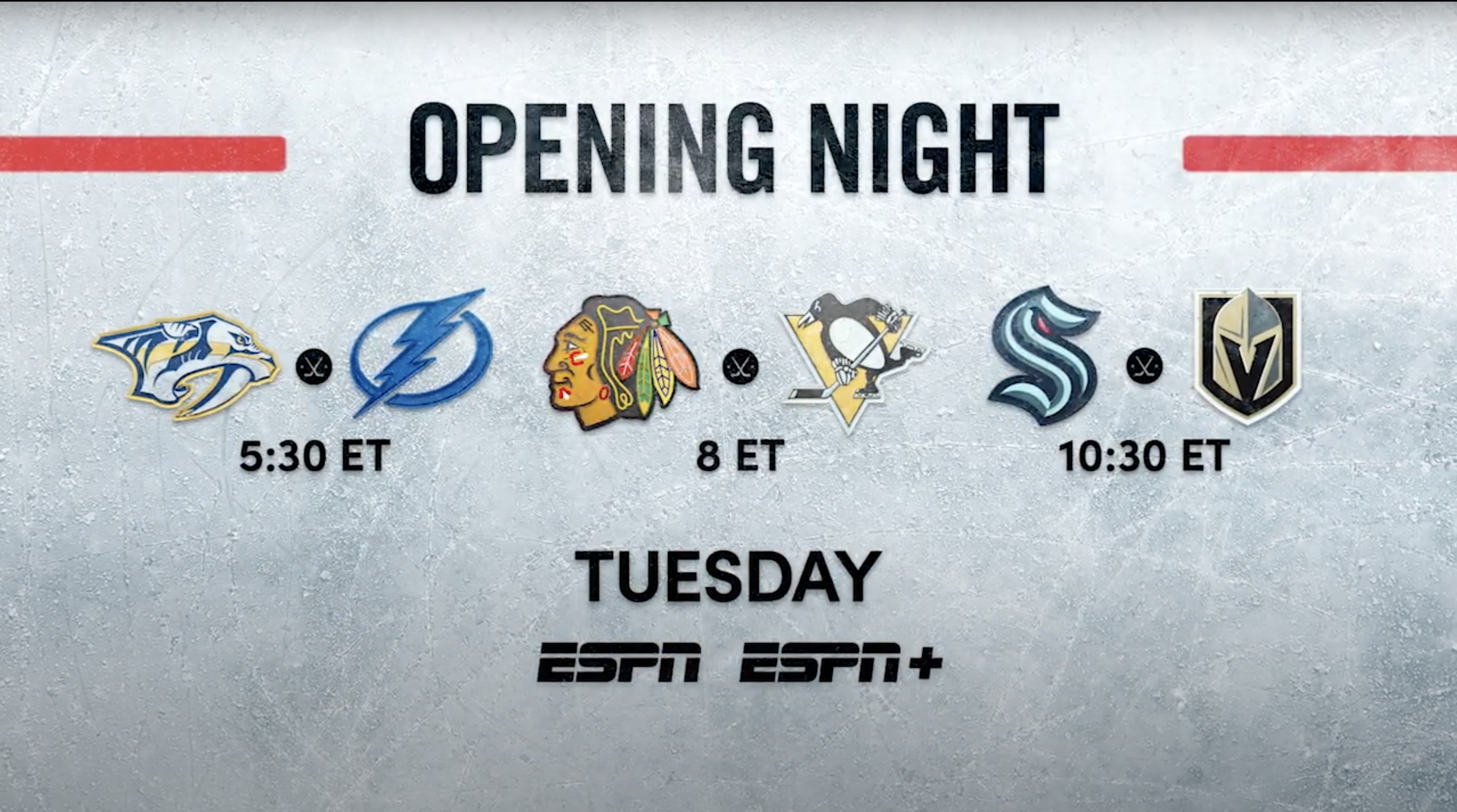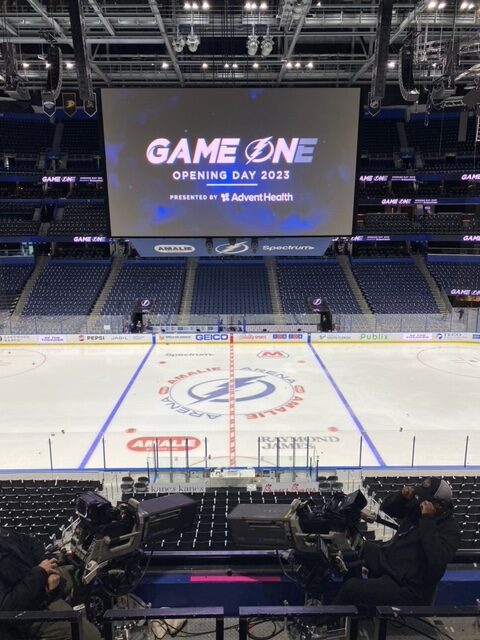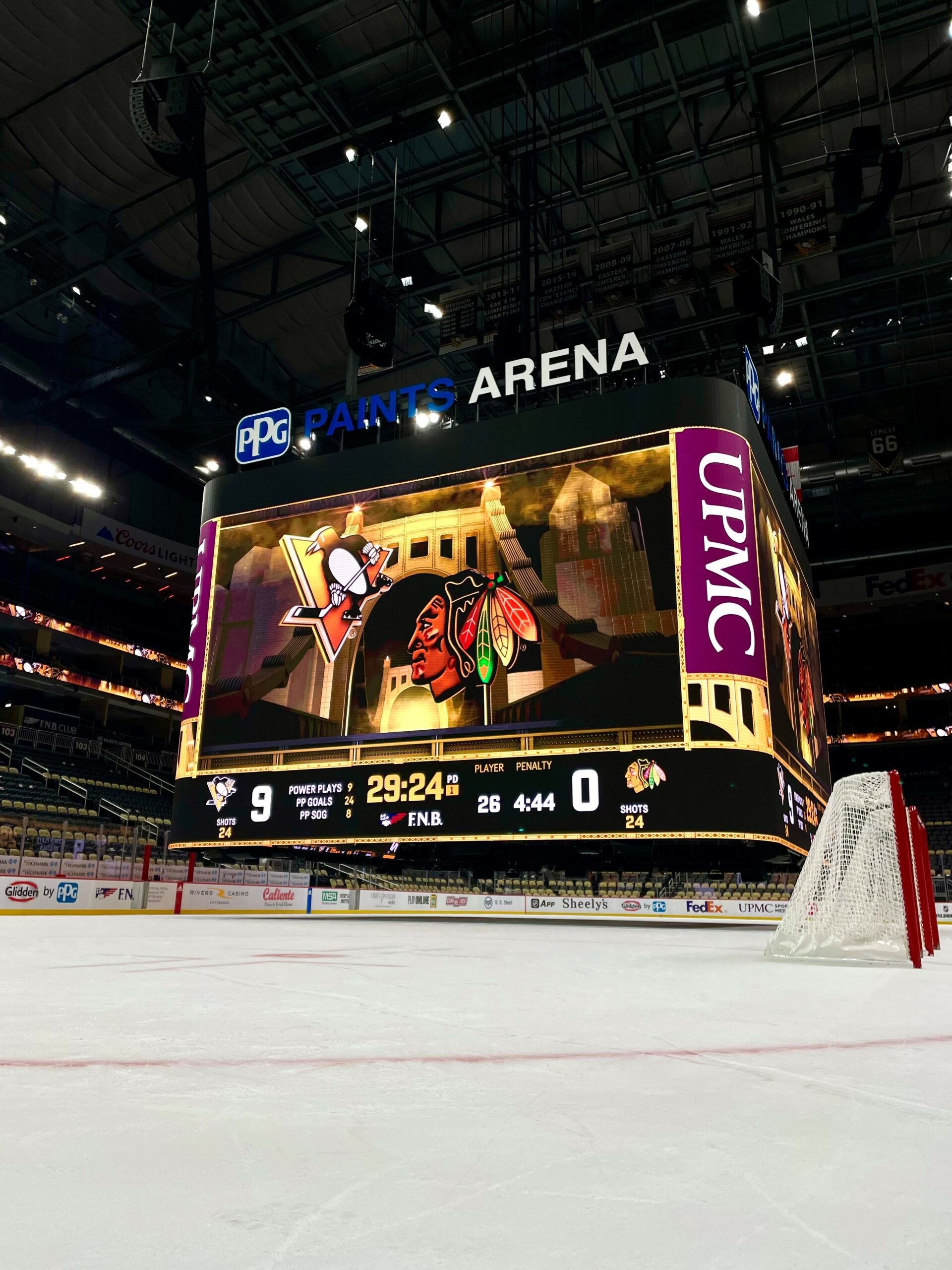NHL Puck Drop 2023: ESPN Ramps Up Remote Workflows, Digitally Enhanced Dasherboards in Stanley Cup Season
Planning, coordination are key for coverage in opening-night tripleheader
Story Highlights
Starting another Stanley Cup year, ESPN has its sights set on continuing what worked in its first two seasons of NHL coverage. From the return of league-managed Digitally Enhanced Dasherboards (DEDs) to an increase in remote workflows, tonight’s season-opening tripleheader — Predators–Lightning at 5:30 p.m. ET, Blackhawks–Penguins at 8 p.m., Kraken–Golden Knights at 10:30 p.m. — posed a programing challenge that the production team combated with precise planning.
“We need to make sure that we take advantage of every precious moment of programming time,” says Linda Schulz, coordinating producer, ESPN. “With a tripleheader, that means bringing fans the numerous opening-night festivities while also making sure we’re getting to puck drops quickly.”
Third Time’s the Charm: DED Tech, Enhanced Remote Workflows Highlight NHL on ESPN
From the jump, ESPN will continue the tech initiatives that it has cultivated over the past two seasons. On all broadcasts, the broadcaster will work closely with the league to once again deploy DEDs for virtual advertising. Introduced last year with the help of Supponor, the integration of catered sponsorship and signage is building on the success of the 2022-23 season.
“The technology proved successful last season,” says Erin Orr, senior remote operations manager, ESPN, “and we look to continue to provide virtual-ad placements along the dashers during gameplay. The augmentation process will be applied downstream of the mobile unit prior to our transmission release.”
Besides this league-mandated technology, the crew will continue to deploy remote workflows for all televised matchups. On the talent side, rules analyst Dave Jackson will once again provide context and insights into officials’ tough calls from his home in Denver. On the behind-the-scenes side, a handful of operations will be conducted from their respective homes.
“Others will also be working from offsite locations,” adds Orr, “including a producer creating packages from his home in Phoenix, [along with] connected users, such as a graphics operator, bug operator, and Libero operator. After the puck drops and the replay room begins creating content clips, file transfer between Bristol and the remote site immediately gets under way. This instantaneous process means that the melt is complete just moments after the clock reaches zero.”
All the upgrades will ultimately lead to ESPN’s showcasing the league and the sport in the best way possible.
“This season brings back the excitement of presenting the Stanley Cup Final at the end of the year,” says Orr. “Our team is highlighting all of the previous workflows and technologies that made the first two seasons so successful, with a keen focus on presenting the Cup in all its glory. Leveraging and fine-tuning those approaches and experiences will allow our group to focus on what the fan wants to see: excellence in coverage and the attention to detail and storytelling that culminates in hoisting the trophy.”
Game Creek Video–NEP Tandem: Both Mobile-Unit Providers Supply Nationwide Trucks
To span the entire country, ESPN will rely on two mobile-unit providers — Game Creek Video and NEP Group — for onsite trucks and infrastructure at each venue. To pull off 100 exclusive games across ESPN, ESPN+, ABC, and Hulu, the broadcaster is leaning on its relationship with both companies and their respective onsite crews.
“We’re grateful for the partnership, collaboration, and dedication each company provides us,” says Jeff Werner, senior remote operations specialist, ESPN. “The mobile-unit fleet and teams are critical in the day-to-day productions.”
Tonight’s tripleheader requires three distinct setups: NEP NCP10 in Tampa Bay, NEP EN2 in Pittsburgh, and GCV Larkspur in Las Vegas. When it comes to nearly five consecutive hours of live game coverage, keeping all the crews organized and focused will be necessary for a seamless night of hockey.
“Preparation is key to our teams’ success,” Orr explains. “We find it to be essential and not optional. We’ve thought [of every scenario] ahead, planned for what we need, and worked to break down processes to ensure we have the best practices in place.”
Besides tonight’s opener, ESPN is facing one of its busiest times of year. On its recent and immediate schedule: the conclusion of Sunday Night Baseball via REMI after the MLB Wild Card; weekly productions of Monday Night Football via REMCO (remote-controlled) replay, graphics, and clock and score; multiple NHL productions each week via REMI for games on Tuesdays and Thursdays; the 2023 WNBA Finals between the New York Liberty and Las Vegas Aces via REMCO; college-football productions via REMI on Thursdays, Fridays, and Saturdays; and the start of the NBA season in two weeks via REMI on Wednesdays and split operations between Bristol, CT, and Charlotte, NC, on Fridays.
“Each sport has its own unique technical requirements and setup,” says Tara Shea, remote operations supervisor, ESPN, “but our teams have implemented workflows and our facilities are flexible enough to support different productions every day. To balance these needs, we create core crews and also rely on our operators’ versatility to strategically support the variety of sports. There are lots of moving pieces, but we’ve been working with our partners for months in anticipation of the return of the NBA and NHL seasons.”
Besides mobile units, game coverage will be augmented by a camera complement that highlights the fast pace of the sport.
“ESPN’s goal is always to display the speed, sounds, and excitement on the ice to the viewer at home,” adds Schulz. “We will continue to use traditional camera positions with enhancements from Fletcher robotics around the ice shooting at 300 frames per second. In addition to bringing the viewer closer to the action, various POV cameras are strategically placed throughout the arena.”
New Faces, New Teams: First Year of Conor Bedard, Improved Rosters Highlight Storylines
From a production standpoint, the upcoming NHL season will feature a bevy of talented players and teams. There has been abuzz around the league since the Chicago Blackhawks drafted Conor Bedard as the No. 1 overall pick in the 2023 NHL Draft. Given that hype about a player can impact not only the organization but the entire league, hockey fans from all 32 franchises will be watching the newly minted pro. In addition, many clubs have bolstered their roster to make a run at the ultimate prize.
“We’re interested to see where teams will land after acquiring and trading players,” adds Schulz. “The Kraken took a big step forward last season, and their nationwide fanbase may get to see further success in a very young franchise. Some people are already looking for a Vegas two-peat, while others are curious to see if the Bruins will be able to rebound after a heartbreaking playoffs.”
To tell these stories on opening night, three announce teams will lead viewers through a long, fun night of professional hockey. The Point — ESPN’s flagship NHL studio show — leads off at 5 p.m., with host Steve Levy and analysts Mark Messier and P.K. Subban setting the table. Predators–Lightning will be called by play-by-play announcer John Buccigross and analysts Kevin Weekes and Ryan Callahan at Amalie Arena. For Blackhawks–Penguins, play-by-play announcer Sean McDonough will be on the call with analyst Ray Ferraro and reporter Emily Kaplan at PPG Paints Arena. Play-by-play announcer Bob Wischusen, analyst AJ Mleczko, and reporter Leah Hextall will be behind the mic for Kraken–Golden Knights at T-Mobile Arena. Between games, the trio of Levy, Messier, and Subban will break down the previous game’s action and preview the next game.
Always Moving Forward: ESPN Production, Ops Strive for Continued Improvement
Operationally, a large team is involved all season long, including Director Carlton Young; Operations Specialists Jon Winders and Brock Wetherbee; Operations Coordinator Carson Kenney and Adam Moossman; Remote Operations Producers Katy Abbott, Phil Erwin, Matt Pecarovich, Andrew Schneider, Seth Shore, and Dave Walker. During each game, many others play a pivotal role on many fronts: crewing — Senior Manager, Crewing, Eileen Lauer; Senior Crewing Coordinator Paula Grahame; and Crewing Coordinators Ronnach Mensah and Eric Lopes; mobile-unit configuration — Remote Production Operations Manager Martin Vilem; production operations — Director, REMI Operations, Daniel Lannon and Technical Operations Manager Marissa Bonertz; remote traffic — Director, Remote Traffic Operations, Adam Whitlock; Assistant Manager, Remote Traffic, Daryl Timothy; Remote Traffic Producer Pete Whychulis; and Senior Remote Traffic Coordinator Rich Rappi; and ACRF Remote Operations — Associate Managers, Remote Operations, Ryan Zainic and Jesse Kupec and Senior Comms, Audio and RF Coordinator, Katherine White.
Heading into the third year of the NHL deal, ESPN is striving to improve many elements, and team members push each other to be their very best.
Says Orr, “The sport of hockey shares many similarities to remote television: the days it takes to prepare, set up, and execute live coverage of an NHL game requires the same type of synchronization, conflict resolution, tenacity, and mental and physical toughness as [the action] on the ice does. Our team has the tools to continue their teamwork, challenge each other, find balance, and strive to make each other better.”



